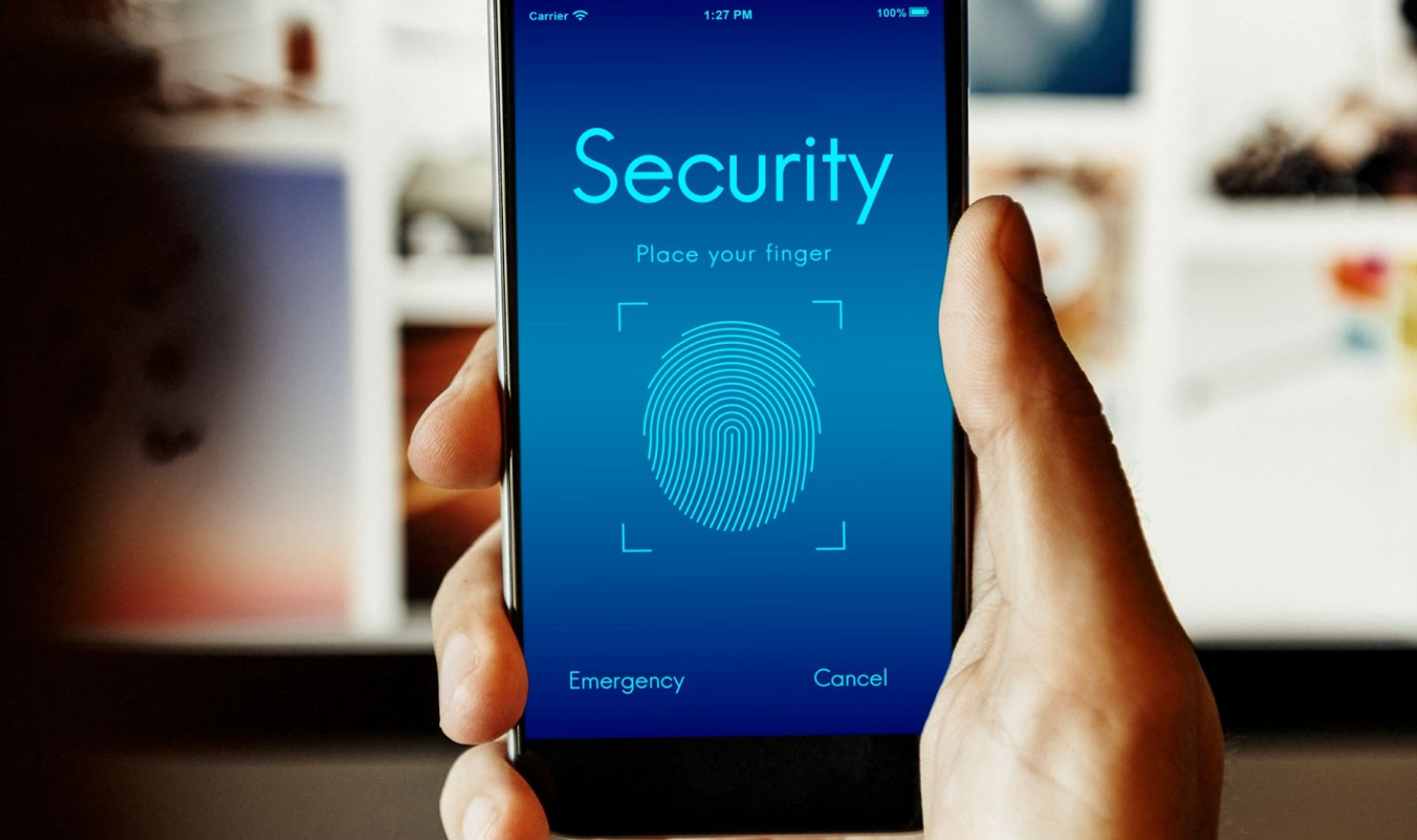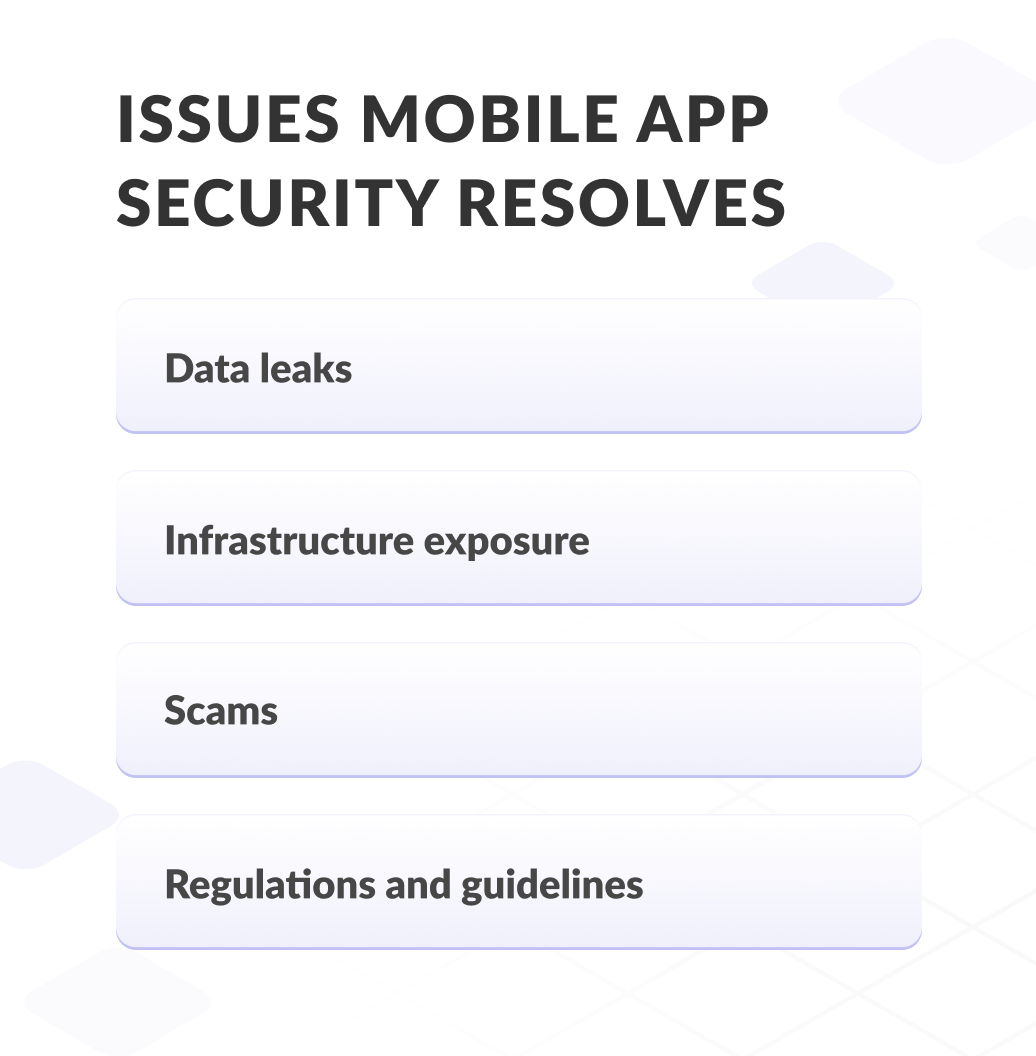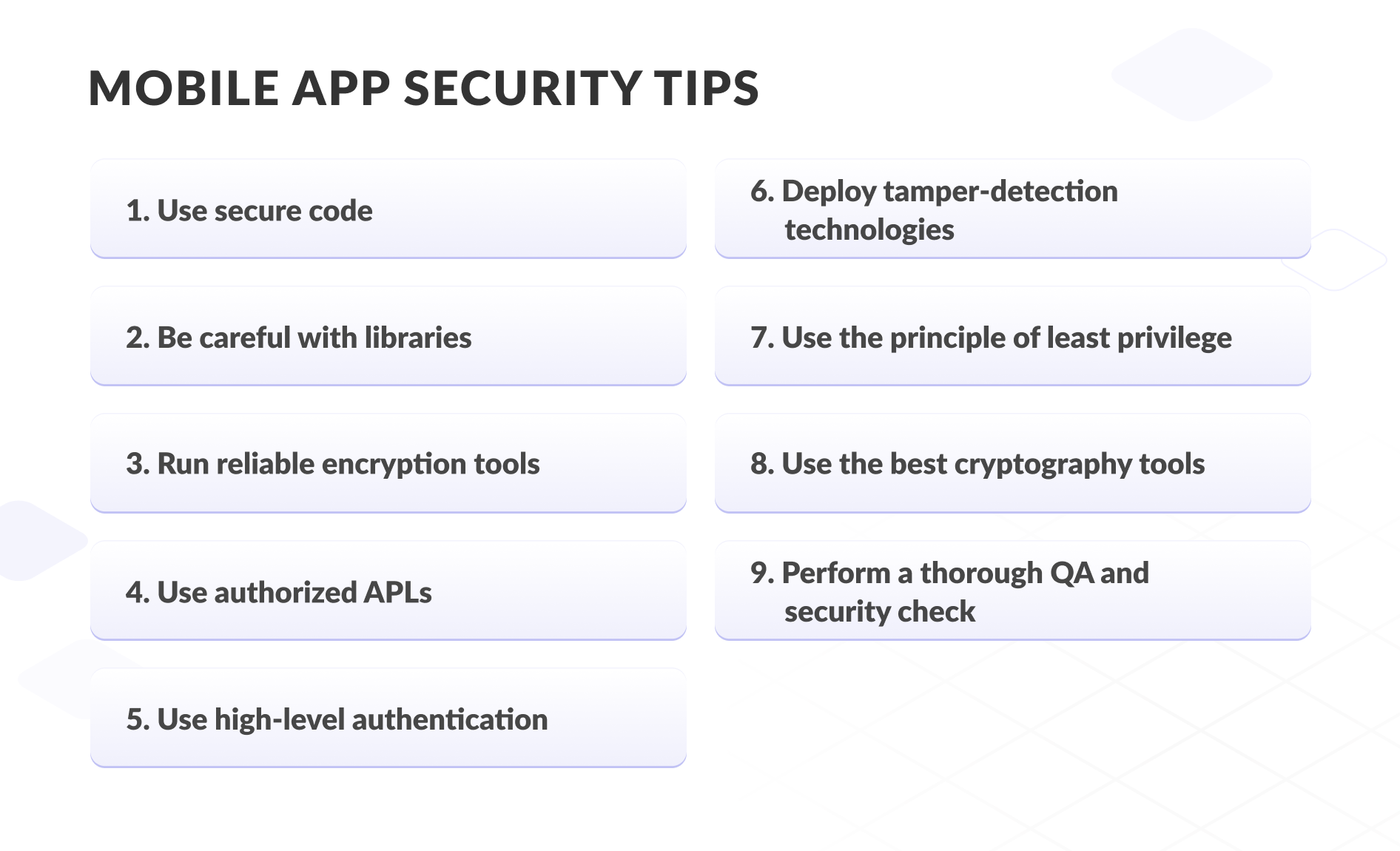Mobile phones have become a central part of our lives, surpassing the popularity of desktops and laptops. Companies nowadays take the mobile-first approach when designing and developing applications because the overwhelming majority of mobile users spend 90% of their time on mobile apps. Thus, it has become increasingly vital to consider mobile application security and guarantee that users’ sensitive details stay safe.
In this post:

Mobile-app security breaches can potentially harm an entire operating system, so it is essential to ensure mobile app security from data theft. It’s not easy to identify a threat in mobile apps and define its security level. However, with a company's reputation and users’ personal information at stake, developers need to do everything in their power to secure mobile apps ensure that users’ are protected from external intrusions.
Keep reading if you’re wondering how mobile application security works and how to protect mobile applications with mobile application security best practices.
WHAT IS MOBILE APP SECURITY?
Whenever users make online purchases or banking transactions, they leave a digital footprint behind, such as their:
- personal name,
- street address,
- phone number,
- banking information, etc.
This highly-sensitive data optimizes the user experience. However, sensitive data also makes us susceptible to external threats, like hackers if there is insecure data storage. So, when we talk about mobile application security, we mean the measures we take to secure the applications from external threats that don’t give hackers the ability to access personal, financial information and confidential data distantly or from lost and stolen devices.
We do not often consider how to secure mobile apps until a breach into the app has already been made. It may be too late to save all the personal information when this happens, so it’s best to think about security beforehand.
HOW DOES MOBILE APPLICATION SECURITY WORK?
As companies connect with their customers through mobile apps and users rely on them when it comes to security, they should invest more time and money into mobile application protection.
The mobile app market is growing larger and more competitive by the day. Considering that 100% of the top 100 paid apps in the Google Play store have been hacked to date, it is clear that companies that prioritize mobile app security can use it as a valuable asset and differentiator. Moreover, investing in mobile app security can help resolve some of the most common problems that companies often face and prevent mobile app vulnerabilities.
PROBLEMS MOBILE APP SECURITY HELPS RESOLVE
Users are not the only ones that can be greatly affected by poor mobile app security. Consider the most common mobile app security issues companies face – data and sensitive information leaks, infrastructure exposure, scams, issues with regulations and guidelines.

01
DATA LEAKS
Applications with porous firewalls are at continuous risk of being breached. Statista research shows that a record number of data leaks took place in 2017. The following year, a peak number of records were exposed. Although the numbers have dropped since then, data leaks still pose a major threat.
02
INFRASTRUCTURE EXPOSURE
Furthermore, if API integration is not properly observed, it can threaten user data storage and server-level security. According to Statista research, this is a widespread issue as a number of frequently used websites have had their data compromised. Some of the most popular websites have faced many issues due to infrastructure exposure, including:
- Yahoo,
- Aadhaar,
- Spambot,
- Apollo,
- Facebook, etc.
03
SCAMS
Any application created to perform financial transactions will always be vulnerable to fraudsters, so scams are rather frequent occurrences. Anyone can fall victim to a scam, including digital natives. These internet scams have amounted to $100 billion in private and company losses, and research shows that online scams have skyrocketed in recent years.
04
REGULATIONS AND GUIDELINES
Lastly, all applications have to operate within a legal and social framework. When that is not the case, users can fall victim to cybercrime which is continuously on the rise, according to Statista research. The most common types of cybercrime include:
- phishing/vishing/smishing,
- non-payment/non-delivery,
- extortion,
- personal data breaches,
- identity theft, etc.
- spoofing,
- misrepresentation,
- confidence/romance fraud.
MOBILE-FIRST SECURITY METHODS
In recent years, mobile-first has become the prevalent approach to design and development due to the ever-increasing popularity of mobile phones. The prevalence of this approach has led to the development of a mobile-first set of security methods. It includes the following security measures:
- Protection against malicious apps, can be done by downloading anti-malware for your mobile phone. If you happen to download a malicious code, app or attachment, the threat to the user’s device can be easily prevented with the help of anti-malware.
- Masking the app's view in the app switcher, which means that you can’t preview one app’s content when switching to different other apps.
- Securing clipboards, which ensures that user’s password is not visible in other apps.
- IPC protection (Inter-Process Communication), is a safety measure that enables communication between apps or apps and the system.
- UI security analysis, such as password masking or data validation.
- Anti-tampering involves security measures that protect against code modification or reverse engineering.
Now that all the threats are clear, let’s take a look at the top mobile application security tips.
MOBILE APP SECURITY BEST PRACTICES AND TIPS IN 2022
As the technology continues to evolve, mobile app safety best practices are constantly changing and becoming increasingly sophisticated. Consequently, the methods of ensuring mobile app security have also changed over the course of time.
So, let’s take a look into some of the best practices and tips for app developers on how to improve security for apps.

WRITE A SECURE CODE
The easiest way to ensure the security of mobile apps for app developers is to write reliable code as it will help you protect your app from attackers. Attackers will try to tamper with your code and reverse engineer it, so make sure it is obfuscated and minified. Continuous mobile app security testing and fixing bugs is also important in order to have secure code.
If your code does happen to get breached, make sure that it is agile so you can easily update it.
BE EXTRA CAUTIOUS WITH LIBRARIES
While using third-party libraries can make mobile development much easier, such an approach does come with certain consequences. To ensure ultimate mobile application security, it is recommended that you test the code before using it in an app when relying on third-party libraries. Other good advice is to limit the number of libraries used in a code, as well as to have a policy on how to handle them.
Having an established policy of using such third-party elements can help you ensure mobile app security more easily.
RUN THE BEST ENCRYPTION TOOLS AND TECHNIQUES
In simple terms, encryption means that even if data is stolen from the data storage, there’s nothing criminals can read and misuse. Because of this, it is crucial that you make sure that every single part of data in your code is encrypted.
Even big companies and organizations, such as the FBI, have trouble getting past encrypted pieces of data, so hackers will certainly have a difficult time as well.
USE AUTHORIZED APIS ONLY
Developers quite often rely on using APIs as they make their job a lot easier. However, APIs can be susceptible to external breaches as well. Therefore, it is recommended that APIs are authorized centrally for maximum security. APIs that aren’t authorized and are loosely coded can unintentionally grant hacker privileges.
For maximum security, make sure that your APIs are authorized centrally.
USE HIGH-LEVEL AUTHENTICATION
Authentication refers to the use of passwords and other personal identifiers. Interestingly, some of the biggest security vulnerabilities happen due to weak authentication. To ensure maximum protection of your mobile devices and apps from security issues, it is important to use strong multifactor authentication.
When it comes to passwords, you can use several techniques recommended by security experts to ensure mobile app security, such as:
- Dual-factor authentication;
- Modern authentication methods, such as retina or fingerprint scanning.
DEPLOY TAMPER-DETECTION TECHNOLOGIES
If hackers can access your code, they can try to modify it or tamper with it in different ways in order to gain access to personal data. However, there are ways to combat such practices. For example, active tamper detection can be deployed to make sure that the code will not function at all if modified.
Developers use these techniques to make sure they get notified when someone tries to modify their code or inject a malicious code.
USE THE PRINCIPLE OF LEAST PRIVILEGE
If you’re not already familiar with the principle of least privilege, it’s a principle that dictates that a code should run with only the permissions it absolutely needs. This principle is also applicable to every facet of the IT industry, including the end user, systems, processes, networks, applications, and many more.
For example, the principle of least privilege means that an app shouldn’t require access to all the photos in your library, private information, or your contacts, nor should it make unnecessary network connections.
USE THE BEST CRYPTOGRAPHY TOOLS AND TECHNIQUES
Due to rapid development of technology, some of the most popular cryptographic algorithms are no longer as effective as they used to be. This means that you should always stay updated on the latest cryptography tools and techniques to prevent security threats.
As far as cryptography goes, in order to ensure mobile app security, you should follow safe key management: store keys in secure containers and never ever store them locally on the user’s device.
PERFORM A THOROUGH QA AND SECURITY CHECK
Mobile application security is a process that never ends. New security threats emerge and new solutions are needed. Whether you work in a company or you’re a freelance developer, running security checks is a necessary part of a high-quality development process. Not only will you develop an secure app that users will love to use, you will also gain business credibility.
So, make sure to constantly run code and security checks.
OUR EXPERIENCE
The Geniusee team is a group of technology-addicted specialists who create web platforms and mobile applications with different levels of complexity, step-by-step, from requirement elicitation and design to technical support in the future.
We have completed more than 40 projects on time and budget in different domains, including in the fintech software development services, retail, automotive, real estate, transportation, education software development, and tourism industries. We are always on the client’s side and we can prevent from the security issues.
Whatever your mobile application strategy is, Geniusee can help you achieve it with our expertise. With ample experience in native iOS, Android, and Hybrid app development, ensuring top-notch security for any mobile application is something we can guarantee.
CONCLUSION
People will continue relying on their mobile phones more and more. With all of their functionalities, they are an indispensable part of our lives, so it is important that we treat mobile application security—and thereby our data—with utmost attention.
Understanding the potential risks from security issues and learning the right techniques to keep your phone protected are key to ensuring mobile application protection. Secure coding practices, continuous security testing, penetration tests and a focus on positive user experiences can all greatly enhance security.
You don’t have to be Google to implement the latest tech; the right software partner may be just what you need to stay within your budget and make the needed changes. Geniusee can help you bring your Mobile App Security technology into the future. Our team of specialists can protect your mobile applications and provide constant technical support, as we have many apps in our portfolio.





















